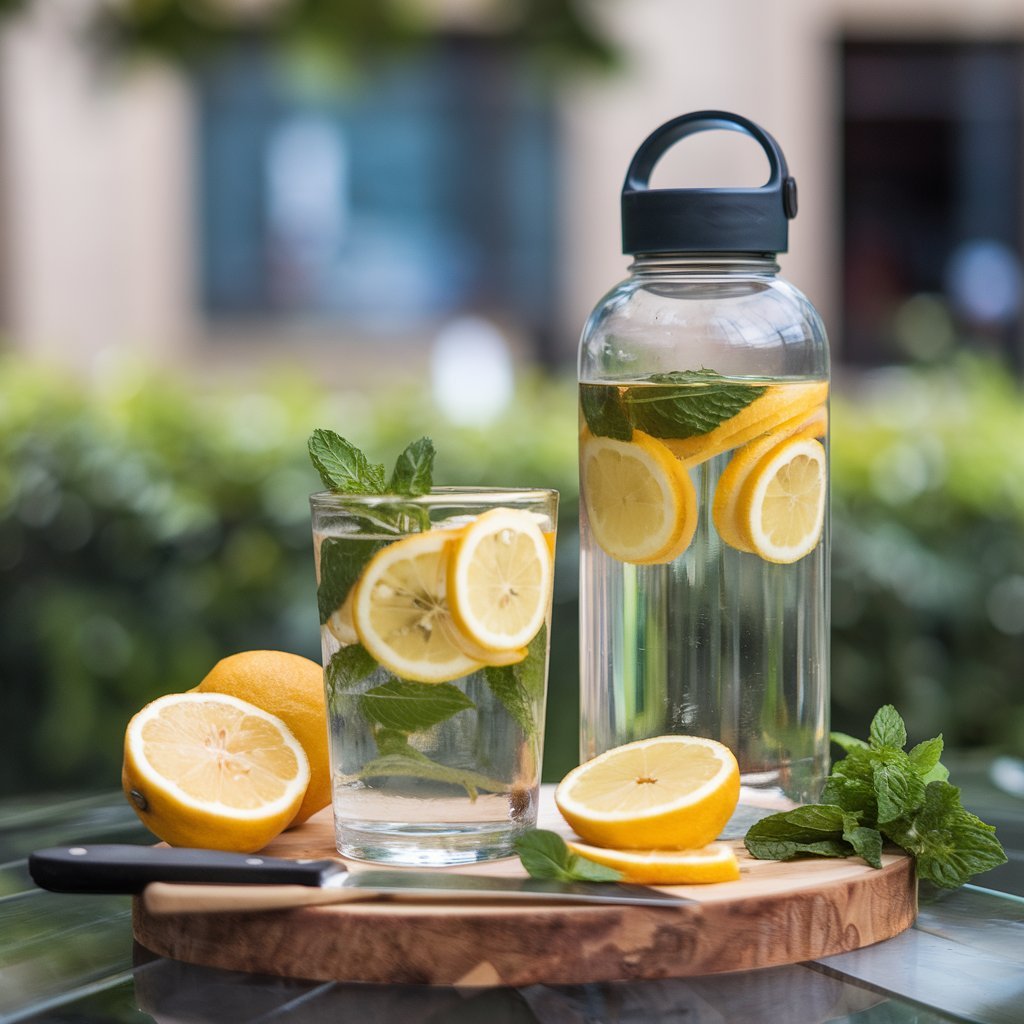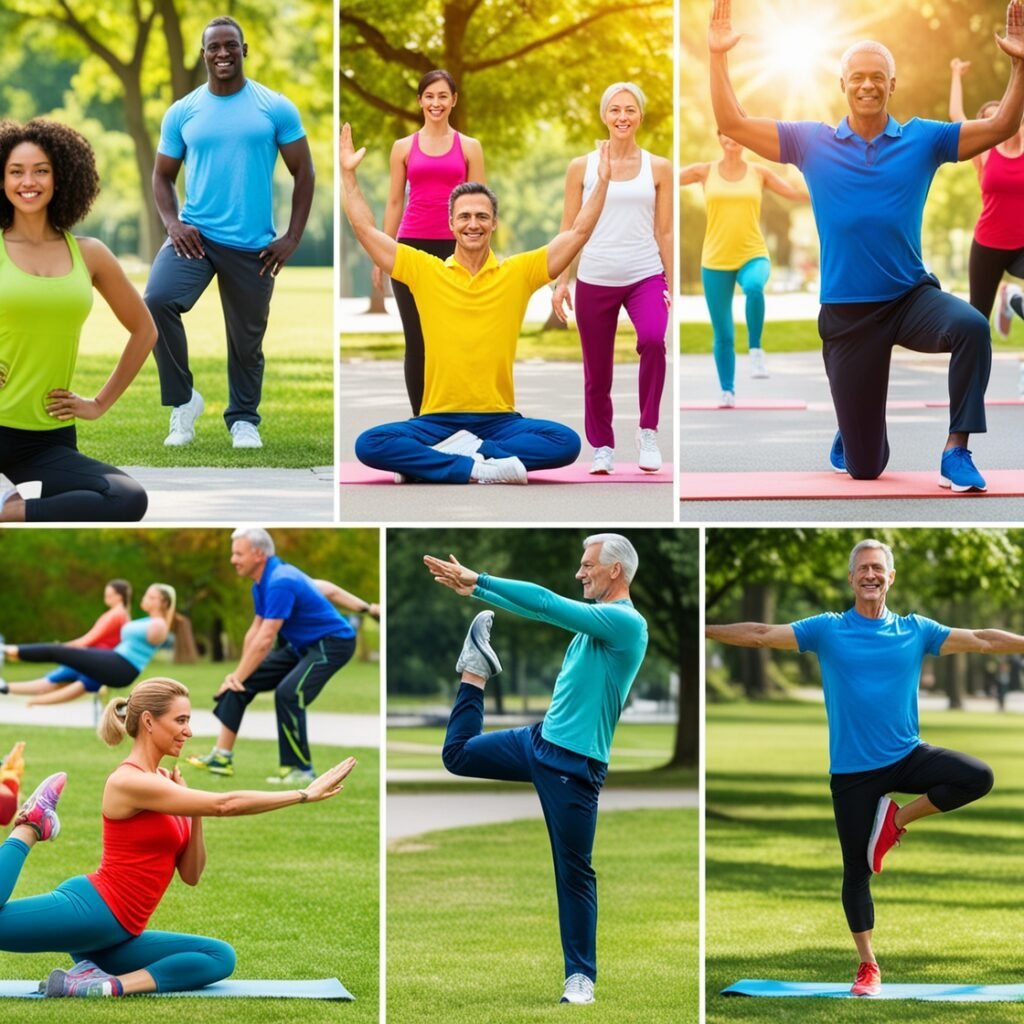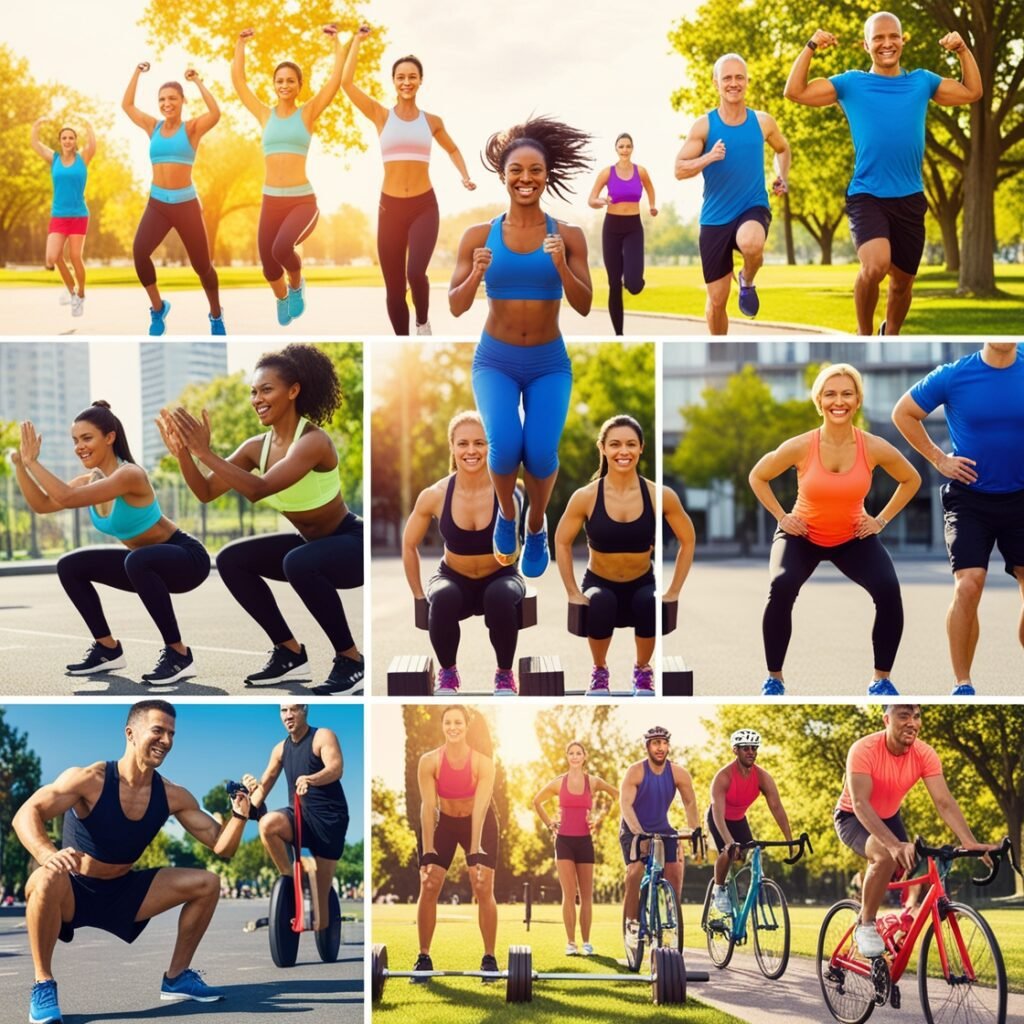Introduction
Have you ever felt sluggish, unfocused, or just not quite like yourself? What if the solution to boosting your energy, improving your mood, and enhancing your overall health was as simple as drinking more water? Staying hydrated is one of the most fundamental yet often overlooked aspects of well-being. Whether you’re an athlete pushing your limits, a busy professional juggling deadlines, or someone simply looking to feel your best, hydration plays a crucial role in how your body and mind function.
Water isn’t just a basic necessity—it’s the foundation of life. From regulating body temperature to supporting digestion and even improving skin health, the benefits of staying hydrated are vast. Yet, many of us struggle to drink enough water daily, often dismissing the subtle signs of dehydration until they become hard to ignore.
In this blog, we’ll dive into why hydration is so essential, how to recognize when you’re not drinking enough, and practical tips to make staying hydrated effortless. Whether you’re curious about how much water you really need or looking for creative ways to make hydration a habit, this guide has you covered. Let’s explore how something as simple as a glass of water can transform your health and well-being. Ready to quench your thirst for knowledge? Let’s get started!
Table of Contents
Staying Hydrated
Why Staying Hydrated is Essential for Your Health
Have you ever wondered why water is often called the elixir of life? It’s not just a catchy phrase—water is the cornerstone of nearly every function in your body. From keeping your energy levels up to ensuring your organs work efficiently, staying hydrated is non-negotiable for optimal health. Let’s break down why hydration is so vital and how it impacts your daily life.
The Role of Water in Bodily Functions
Water is the unsung hero of your body’s daily operations. It’s involved in almost every process, including:
- Regulating body temperature: Sweating might feel inconvenient, but it’s your body’s way of cooling down and staying balanced.
- Aiding digestion: Water helps break down food and keeps your digestive system running smoothly.
- Transporting nutrients: It acts as a delivery system, ensuring vitamins and minerals reach your cells.
- Flushing out toxins: Proper hydration supports your kidneys in filtering waste and keeping your system clean.
Without enough water, these processes slow down, leaving you feeling off-kilter.
How Dehydration Impacts Energy and Focus
Ever had one of those days where you feel like you’re dragging yourself through mud? Dehydration might be the culprit. Even mild dehydration can lead to:
- Fatigue and low energy levels
- Difficulty concentrating or brain fog
- Headaches and irritability
Think of your brain as a high-performance engine—it needs water to function at its best. When you’re dehydrated, your cognitive abilities take a hit, making it harder to stay sharp and productive.
Long-Term Health Benefits of Proper Hydration
Staying hydrated isn’t just about avoiding thirst; it’s about investing in your long-term health. Consistent hydration can:
- Support heart health: Water helps maintain blood volume, which is essential for cardiovascular function.
- Boost immune function: A well-hydrated body is better equipped to fight off illnesses.
- Promote joint health: Water keeps your joints lubricated, reducing the risk of discomfort or injury.
- Enhance skin health: Hydration plumps up your skin, reducing the appearance of fine lines and giving you a natural glow.
A Simple Habit with Big Rewards
The beauty of staying hydrated is that it’s one of the simplest yet most impactful habits you can adopt. Whether you’re sipping water throughout the day or enjoying water-rich foods, every drop counts. So, the next time you reach for a glass of water, remember: you’re not just quenching your thirst—you’re fueling your body for a healthier, more vibrant life.
Ready to dive deeper into the signs of dehydration and how much water you really need? Let’s keep the momentum going!
Signs You’re Not Drinking Enough Water
Do you ever feel like something’s off but can’t quite put your finger on it? Your body might be trying to tell you it’s running low on water. Dehydration doesn’t always come with a glaring “drink water now” sign—it often shows up in subtle ways that are easy to overlook. Let’s explore the common signs that you’re not drinking enough water and how to address them before they escalate.
Common Symptoms of Dehydration
Your body has a unique way of signaling when it’s thirsty. Here are some telltale signs you might be dehydrated:
- Dry mouth and bad breath: Saliva production drops when you’re dehydrated, leading to a parched mouth and less-than-fresh breath.
- Dark yellow urine: Your urine color is a quick hydration check. Pale yellow means you’re on track; dark yellow or amber is a red flag.
- Fatigue and dizziness: Low water levels can cause a drop in blood volume, making you feel tired or lightheaded.
- Headaches: Dehydration can trigger headaches or migraines, as your brain temporarily contracts from fluid loss.
How to Recognize Early Warning Signs
Sometimes, dehydration creeps up on you before the obvious symptoms appear. Watch out for these early indicators:
- Dry or flaky skin: Your skin loses elasticity when it’s dehydrated, making it feel tight or look dull.
- Muscle cramps: Electrolyte imbalances from lack of water can cause painful muscle spasms.
- Food cravings: Thirst is often mistaken for hunger, especially cravings for salty or sweet snacks.
- Mood swings: Dehydration can affect your mood, leaving you irritable or anxious.
The Impact of Dehydration on Skin and Digestion
Your skin and gut are two areas where dehydration hits hard. Here’s how:
- Skin health: Without enough water, your skin can become dry, flaky, and more prone to wrinkles. Hydration helps maintain a plump, glowing complexion.
- Digestive issues: Water is essential for breaking down food and keeping things moving smoothly. Dehydration can lead to constipation, bloating, and discomfort.
What to Do If You Spot These Signs
If you notice any of these symptoms, don’t panic—hydration is a fixable problem! Start by:
- Sipping water slowly throughout the day.
- Eating water-rich foods like cucumbers, watermelon, and oranges.
- Setting reminders to drink water if you tend to forget.
Remember, your body is always communicating with you. By tuning into these signs and responding with a glass of water, you’re taking a simple yet powerful step toward better health.
Curious about how much water you actually need to stay hydrated? Let’s dive into that next!
How Much Water Do You Really Need?
You’ve probably heard the age-old advice: “Drink eight glasses of water a day.” But is that one-size-fits-all rule really accurate? The truth is, your hydration needs are as unique as you are. Let’s dive into how much water your body truly needs and what factors influence that number.
Daily Water Intake Recommendations
While the “8×8 rule” (eight 8-ounce glasses) is a good starting point, it’s not a hard-and-fast rule. According to the National Academies of Sciences, Engineering, and Medicine, the general guidelines are:
- Men: About 3.7 liters (125 ounces) of total water per day, including beverages and food.
- Women: About 2.7 liters (91 ounces) of total water per day, including beverages and food.
But these numbers are just a baseline. Your individual needs can vary based on several factors.
Factors That Influence Your Hydration Needs
Your lifestyle, environment, and body all play a role in determining how much water you should drink. Here’s what to consider:
- Activity level: If you’re hitting the gym, running, or doing any intense physical activity, you’ll need more water to replace what you lose through sweat.
- Climate: Hot or humid weather can increase your water needs, as can high altitudes.
- Health conditions: Certain conditions, like pregnancy, breastfeeding, or illnesses that cause fever or vomiting, require extra hydration.
- Body size: Larger bodies generally need more water to function optimally.
Debunking the “8 Glasses a Day” Myth
The idea of drinking eight glasses of water daily is easy to remember, but it’s not backed by scientific evidence. Here’s why:
- Water from food counts too: About 20% of your daily water intake comes from food, especially fruits and vegetables like cucumbers, oranges, and lettuce.
- Other beverages contribute: Tea, coffee, and even milk can hydrate you, despite the myth that caffeine dehydrates (it doesn’t, in moderate amounts).
- Your body knows best: Thirst is a reliable indicator of when you need water. Listen to your body—it’s smarter than you think!
How to Find Your Personal Hydration Sweet Spot
So, how do you figure out what’s right for you? Start with these tips:
- Use the urine test: Aim for pale yellow urine. If it’s darker, drink more water.
- Adjust for activity: Drink an extra 1.5 to 2.5 cups of water for moderate exercise, and more for intense workouts.
- Consider your environment: If you’re in a hot or dry climate, increase your intake accordingly.
- Track your habits: Use a water bottle with measurements or a hydration app to monitor your intake.
A Flexible Approach to Hydration
The key to staying hydrated isn’t about rigid rules—it’s about finding a balance that works for your body and lifestyle. Whether you’re sipping water, enjoying a hydrating snack, or indulging in a cup of tea, every bit counts toward keeping you feeling your best.
Ready to explore creative ways to Staying Hydrated? Let’s move on to some fun and practical tips!
Creative Ways to Staying Hydrated Throughout the Day
Let’s face it—drinking plain water all day can get a little boring. But staying hydrated doesn’t have to feel like a chore. With a little creativity, you can make hydration enjoyable, delicious, and even fun. Whether you’re a busy professional, a fitness enthusiast, or just someone looking to drink more water, these tips will help you stay on track without the monotony.
Infused Water Recipes for Added Flavor
Why settle for plain water when you can turn it into a refreshing treat? Infused water is an easy way to add a burst of flavor without extra calories or sugar. Try these simple combinations:
- Citrus splash: Lemon, lime, and orange slices with a few mint leaves.
- Berry bliss: Strawberries, blueberries, and a sprig of basil.
- Cucumber cool: Cucumber slices with a hint of ginger and a squeeze of lemon.
- Tropical twist: Pineapple chunks and coconut water for a vacation vibe.
Pro tip: Prep your infused water the night before and let it sit in the fridge for maximum flavor.
Incorporating Water-Rich Foods into Your Diet
Did you know that about 20% of your daily water intake comes from food? Adding water-rich foods to your meals is a delicious way to stay hydrated. Some top picks include:
- Fruits: Watermelon, oranges, strawberries, and cantaloupe.
- Vegetables: Cucumbers, celery, lettuce, and zucchini.
- Soups and broths: Opt for clear soups or bone broth for a hydrating snack.
These foods not only boost your hydration but also provide essential vitamins and minerals.
Using Apps and Reminders to Track Your Intake
If you’re someone who forgets to drink water, technology can be your best friend. Here’s how to leverage it:
- Hydration apps: Apps like WaterMinder or Daily Water Tracker send reminders and help you set daily goals.
- Smart water bottles: Bottles like HidrateSpark track your intake and sync with your phone to keep you accountable.
- Simple reminders: Set alarms or calendar notifications to prompt you to take a sip.
Make Hydration a Ritual
Turn drinking water into a habit by tying it to daily activities. For example:
- Drink a glass of water when you wake up and before each meal.
- Keep a water bottle at your desk and take a sip every time you check your email.
- Hydrate during TV commercial breaks or between work tasks.
Fun Hydration Challenges
Gamify your hydration goals to make them more engaging:
- The 8×8 challenge: Aim to drink eight 8-ounce glasses of water in a day and reward yourself when you hit the target.
- Color-changing bottles: Use bottles with time markers to track your progress visually.
- Buddy system: Partner with a friend to keep each other accountable and share tips.
Hydration On the Go
Staying hydrated doesn’t stop when you leave the house. Here’s how to keep up while you’re out and about:
- Carry a reusable water bottle wherever you go.
- Choose hydrating snacks like fruit or veggie sticks when you’re on the move.
- Stop for a quick water break during errands or travel.
A Hydration Routine That Works for You
The key to staying hydrated is finding methods that fit seamlessly into your lifestyle. Whether it’s sipping on infused water, snacking on hydrating foods, or using tech to track your progress, there’s a solution for everyone. Remember, hydration doesn’t have to be boring—it can be a flavorful, enjoyable part of your day.
Ready to explore how hydration needs vary across different lifestyles? Let’s dive into that next!
Hydration Tips for Different Lifestyles
Staying hydrated isn’t a one-size-fits-all endeavor. Your daily routine, activities, and environment all play a role in how much water you need and how you can best meet those needs. Whether you’re an athlete, a busy professional, or a frequent traveler, here are tailored hydration tips to fit your unique lifestyle.
Staying Hydrated During Workouts or Physical Activity
If you’re someone who loves breaking a sweat, hydration is key to performance and recovery. Here’s how to stay on top of it:
- Pre-hydrate: Drink 16-20 ounces of water 2-3 hours before exercise, and another 8 ounces 20-30 minutes before starting.
- During exercise: Sip 7-10 ounces of water every 10-20 minutes, especially during intense or prolonged activity.
- Post-workout: Replenish with 16-24 ounces of water for every pound lost during exercise.
- Consider electrolytes: For workouts longer than an hour, opt for a drink with electrolytes to replace what you lose through sweat.
Hydration Tips for Busy Professionals
Juggling meetings, deadlines, and endless to-do lists can make it easy to forget about water. Try these strategies to stay hydrated at work:
- Keep a water bottle at your desk: Choose one with time markers to track your intake throughout the day.
- Pair water with habits: Drink a glass of water before every meeting or after completing a task.
- Set reminders: Use apps or calendar alerts to prompt you to take a hydration break.
- Opt for hydrating snacks: Keep water-rich foods like cucumber slices, berries, or yogurt at your workspace.
How to Maintain Staying Hydrated While Traveling
Traveling can throw off your hydration routine, but with a little planning, you can stay on track:
- Pack a reusable water bottle: Fill it up after security checks at airports or at rest stops during road trips.
- Start your day with water: Drink a glass as soon as you wake up to kickstart hydration.
- Choose water over sugary drinks: Skip the soda and opt for water or herbal tea during flights or long drives.
- Adjust for climate: If you’re traveling to a hot or dry destination, increase your water intake to compensate for extra sweat loss.
Hydration for Parents and Caregivers
If you’re constantly on the go caring for others, don’t forget to take care of yourself too:
- Multitask with hydration: Sip water while preparing meals, helping with homework, or during playtime.
- Make it a family habit: Encourage kids to drink water by setting a good example and making it fun (think colorful straws or fun-shaped ice cubes).
- Keep water accessible: Place water bottles in common areas like the living room or car for easy access.
Hydration for Seniors
As we age, our sense of thirst may diminish, making it easier to become dehydrated. Here’s how seniors can stay hydrated:
- Set a schedule: Drink water at regular intervals, even if you don’t feel thirsty.
- Flavor it up: Add a splash of fruit juice or herbal tea to make water more appealing.
- Monitor medications: Some medications can increase dehydration risk, so consult your doctor about your hydration needs.
- Eat hydrating foods: Incorporate soups, smoothies, and water-rich fruits into your diet.
A Hydration Plan That Fits Your Life
No matter your lifestyle, staying hydrated is about finding what works for you. By tailoring your approach to your daily activities and preferences, you can make hydration a seamless and enjoyable part of your routine.
Curious about how hydration impacts your mental well-being? Let’s explore that next!
The Connection Between Hydration and Mental Wellbeing
Did you know that your water intake can influence more than just your physical health? Hydration plays a surprising role in your mental well-being, affecting everything from your mood to your ability to focus. Let’s dive into how staying hydrated can boost your brainpower, improve your emotional balance, and help you feel your best mentally.

How Water Intake Affects Mood and Cognitive Function
Your brain is about 75% water, so it’s no surprise that hydration has a direct impact on how it functions. Here’s how water influences your mental state:
- Improved focus and clarity: Even mild dehydration can impair concentration, memory, and decision-making. Staying hydrated helps you stay sharp and productive.
- Better mood regulation: Dehydration can lead to irritability, anxiety, and even feelings of overwhelm. Drinking enough water helps stabilize your emotions.
- Enhanced creativity: A well-hydrated brain is better at making connections and thinking outside the box.
The Link Between Hydration and Stress Reduction
Feeling stressed? Your water bottle might be part of the solution. Here’s why:
- Hydration supports cortisol regulation: Cortisol, the stress hormone, can spike when you’re dehydrated, making you feel more anxious.
- Water as a calming ritual: Taking a moment to sip water can serve as a mini mindfulness break, helping you reset during a hectic day.
- Physical comfort: Dehydration can cause headaches or fatigue, which only add to stress. Staying hydrated keeps these symptoms at bay.
Tips for Staying Hydrated to Boost Mental Clarity
Want to harness the mental benefits of hydration? Try these practical tips:
- Start your day with water: After hours of sleep, your body is naturally dehydrated. A glass of water in the morning kickstarts your brain for the day ahead.
- Keep water visible: Place a water bottle on your desk or in your bag as a visual reminder to drink.
- Hydrate before mental tasks: Drink water before studying, working, or any activity that requires focus.
- Pair hydration with breaks: Use water breaks as an opportunity to step away from screens and recharge mentally.
Hydration as a Tool for Mental Resilience
Staying Hydrated is a simple yet powerful tool to support your mental resilience. By keeping your brain hydrated, you’re not just improving your focus and mood—you’re setting yourself up for long-term mental well-being.
Hydration and Weight loss
When it comes to weight management, hydration might not be the first thing that comes to mind. But did you know that drinking enough water can be a game-changer for your weight loss or maintenance goals? From boosting metabolism to curbing cravings, hydration plays a surprisingly powerful role in helping you achieve a healthy weight. Let’s explore how staying hydrated can support your journey.
How Water Supports Metabolism and Appetite Control
Your body’s ability to burn calories and regulate hunger is closely tied to hydration. Here’s how water helps:
- Boosts metabolism: Drinking water can temporarily increase your metabolic rate, helping you burn more calories throughout the day.
- Suppresses appetite: Sometimes, thirst is mistaken for hunger. Staying hydrated can help you distinguish between the two, reducing unnecessary snacking.
- Promotes satiety: Drinking water before meals can help you feel fuller, leading to smaller portion sizes and fewer calories consumed.
The Impact of Staying Hydrated on Workout Performance and Fat Loss
If you’re working out to shed pounds, hydration is your secret weapon. Here’s why:
- Improved energy levels: Dehydration can zap your energy, making workouts feel harder and less effective.
- Enhanced fat burning: Water is essential for lipolysis, the process by which your body breaks down fat for energy.
- Better recovery: Staying hydrated helps your muscles recover faster, so you can stay consistent with your fitness routine.
Tips for Using Water to Curb Cravings
Cravings can derail even the best-laid weight management plans. Here’s how water can help you stay on track:
- Drink before eating: Have a glass of water 20-30 minutes before meals to reduce overeating.
- Flavor your water: Add a splash of lemon, cucumber, or mint to make water more appealing and satisfying.
- Replace sugary drinks: Swap soda, juice, or energy drinks with water to cut empty calories.
- Stay consistent: Carry a water bottle with you to sip throughout the day and avoid dehydration-induced cravings.
Hydration and Its Role in Reducing Water Retention
It might sound counterintuitive, but drinking more water can actually help reduce bloating and water retention. Here’s how:
- Flushes out excess sodium: Water helps your kidneys remove excess sodium, which can cause bloating.
- Balances fluids: When you’re dehydrated, your body holds onto water as a survival mechanism. Staying hydrated signals your body to release stored fluids.
A Simple Habit with Big Results
Staying hydrated as a part of your weight management plan doesn’t require drastic changes—just a few mindful habits. Whether it’s drinking water before meals, staying hydrated during workouts, or swapping sugary drinks for H2O, every sip brings you closer to your goals.
Hydration and Its Impact on Skin Health
Want glowing, healthy skin? Your skincare routine might include serums, moisturizers, and SPF, but there’s one essential step you can’t afford to overlook: Staying hydrated. Water is the foundation of radiant skin, and staying hydrated can transform your complexion from dull to dewy. Let’s explore how Staying hydrated impacts your skin and how you can harness its benefits for a healthier, more vibrant look.
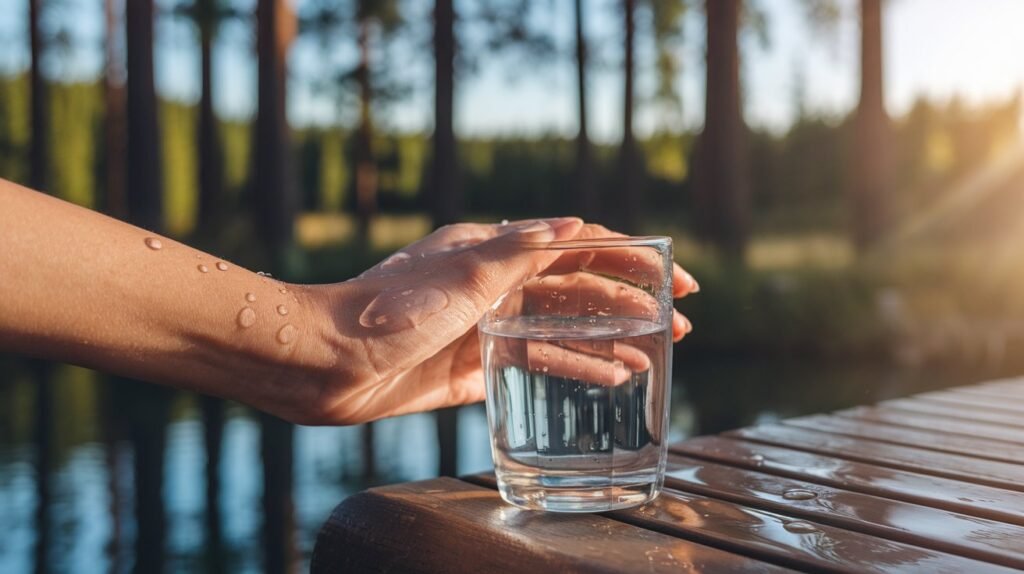
How Water Intake Affects Skin Elasticity and Glow
Your skin is your body’s largest organ, and it thrives on hydration. Here’s how water works its magic:
- Boosts elasticity: Well-hydrated skin is more supple and resilient, reducing the appearance of fine lines and wrinkles.
- Enhances glow: Water helps flush out toxins and improves blood flow, giving your skin a natural, healthy radiance.
- Plumps up skin cells: Hydration fills out skin cells, making your face look fuller and more youthful.
The Connection Between Hydration and Acne Prevention
If you struggle with breakouts, staying hydrated might be the missing piece of the puzzle. Here’s why:
- Balances oil production: Dehydration can cause your skin to overproduce oil, leading to clogged pores and acne.
- Supports skin barrier function: A strong skin barrier keeps irritants out and locks moisture in, reducing the risk of breakouts.
- Aids in detoxification: Water helps your body eliminate toxins that can contribute to acne.
Tips for Maintaining Hydrated, Healthy Skin
Achieving hydrated skin isn’t just about drinking water—it’s a combination of internal and external care. Here’s how to keep your skin quenched:
- Drink plenty of water: Aim for at least 8 glasses a day, and more if you’re active or in a dry climate.
- Eat water-rich foods: Incorporate fruits and vegetables like cucumbers, watermelon, and oranges into your diet.
- Use a hydrating skincare routine: Look for products with hyaluronic acid, glycerin, or aloe vera to lock in moisture.
- Avoid hot showers: Hot water can strip your skin of natural oils. Opt for lukewarm water instead.
- Humidify your space: Use a humidifier, especially in dry environments, to keep your skin hydrated.
The Long-Term Benefits of Hydrated Skin
Staying hydrated isn’t just a quick fix—it’s an investment in your skin’s long-term health. Consistent hydration can:
- Slow the aging process: Well-hydrated skin is less prone to wrinkles and sagging.
- Improve texture: Hydration smooths out rough patches and evens skin tone.
- Enhance product effectiveness: Moisturized skin absorbs serums and creams better, maximizing their benefits.
A Simple Step for Skin That Glows
Staying hydrated is one of the easiest and most effective ways to care for your skin. By drinking enough water, eating hydrating foods, and using the right skincare products, you can achieve a complexion that looks and feels its best.
Choosing the Right Hydration Tools
Staying hydrated is easier when you have the right tools at your fingertips. From reusable water bottles to high-tech hydration trackers, the options are endless. But how do you choose what’s best for your lifestyle? Let’s explore the must-have hydration tools that can help you drink more water effortlessly and sustainably.
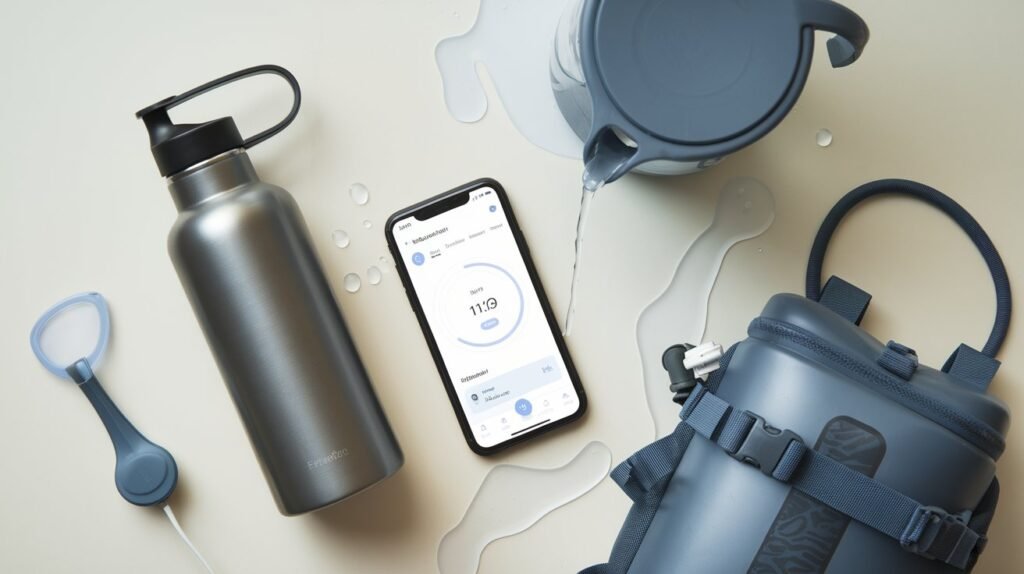
Reusable Water Bottles: Features to Look For
A good water bottle is the foundation of any hydration routine. Here’s what to consider when choosing one:
- Material: Opt for BPA-free plastic, stainless steel, or glass, depending on your preference for durability and taste.
- Size: Choose a size that fits your daily water intake goals—typically 20-32 ounces for most people.
- Lid type: Look for leak-proof lids, straw lids for easy sipping, or wide mouths for adding ice or fruit infusions.
- Insulation: Insulated bottles keep water cold (or hot) for hours, making them ideal for outdoor activities or long workdays.
The Pros and Cons of Hydration Packs and Bottles
If you’re always on the go, hydration packs or specialized bottles might be worth considering:
Hydration packs: Perfect for hikers, bikers, or runners, these backpacks with built-in water bladders allow hands-free hydration.
- Pros: Large capacity, easy to carry during activities.
- Cons: Can be bulky and require regular cleaning.
Collapsible bottles: Great for travelers or those with limited storage space.
- Pros: Lightweight and portable.
- Cons: Less durable and may retain odors.
How to Pick the Best Water Filter for Your Home
Not a fan of tap water? A water filter can make hydration more enjoyable and safe. Here’s how to choose the right one:
- Pitcher filters: Affordable and easy to use, ideal for small households.
- Faucet-mounted filters: Convenient for cooking and drinking, with no need for extra storage.
- Under-sink systems: Provides high-quality filtration without cluttering your countertop.
- Portable filters: Perfect for camping or travel, ensuring clean water wherever you go.
Tech-Savvy Hydration Tools
For those who love gadgets, technology can make hydration fun and trackable:
- Smart water bottles: Bottles like HidrateSpark track your intake and sync with your phone to send reminders.
- Hydration apps: Apps like WaterMinder or Daily Water Tracker help you set goals and monitor progress.
- Water dispensers with trackers: Some dispensers display how much water you’ve consumed, making it easy to stay on target.
Eco-Friendly Hydration Choices
Hydration doesn’t have to come at the expense of the planet. Here’s how to make sustainable choices:
- Reusable over disposable: Ditch single-use plastic bottles and invest in a durable, reusable option.
- Eco-friendly materials: Choose bottles made from recycled materials or brands with sustainable practices.
- Tap water over bottled: Use a filter to improve tap water quality and reduce plastic waste.
A Tool for Every Lifestyle
The right hydration tool can make all the difference in helping you stay consistent with your water intake. Whether you prefer a sleek stainless steel bottle, a high-tech tracker, or a simple pitcher filter, there’s an option out there that fits your needs.
Ready to put these tools for staying hydrated all your day? Let’s wrap up with some final tips and encouragement to keep you motivated!
Conclusion: Staying hydrated to be more healthy
So, what’s the secret to feeling your best, both inside and out? It’s not a magic pill or a complicated routine—it’s something as simple and accessible as water. Staying hydrated is one of the easiest yet most powerful ways to support your health, boost your energy, and enhance your overall well-being. From improving your skin’s glow to sharpening your focus and even preventing long-term health issues, the benefits of Staying hydrated are truly transformative.
But let’s be honest—drinking enough water isn’t always easy. Life gets busy, and it’s easy to forget to sip throughout the day. That’s why finding the right tools, habits, and strategies for your lifestyle is key. Whether it’s carrying a reusable water bottle, infusing your water with fresh fruit, or setting reminders on your phone, small changes can make a big difference.
Remember, staying hydrated isn’t just about drinking water—it’s about creating a habit that supports your body and mind. It’s about listening to your body’s signals, whether that’s a dry mouth, a headache, or just feeling a little off. And it’s about making choices that align with your goals, whether you’re an athlete, a busy professional, or someone simply looking to feel healthier.
As you move forward, think of hydration as more than just a task to check off your list. It’s an act of self-care, a way to show your body the love and attention it deserves. So, grab that water bottle, take a sip, and celebrate the small but mighty step you’re taking toward a healthier, happier you.
Here’s to staying hydrated, feeling great, and making every drop count. Cheers to your health!
References
- Mayo Clinic: “Water: How much should you drink every day?”
- Harvard T.H. Chan School of Public Health: “The Importance of Hydration.”
- American Council on Exercise (ACE): “Healthy Hydration.”
- Journal of the International Society of Sports Nutrition: “Water, Hydration, and Health.”
- American Academy of Dermatology (AAD): “How to Hydrate Your Skin.”
- Dermato-Endocrinology Journal: “The Role of Staying hydrated in Skin Health.”
- Frontiers in Human Neuroscience: “The Impact of Hydration on Cognitive Performance.”
- British Journal of Nutrition: “Effects of Hydration Status on Cognitive Function and Mood.”
- National Kidney Foundation: “The Importance of Staying hydrated for Kidney Health.”
- World Health Organization (WHO): “Water, Sanitation, and Health.”


